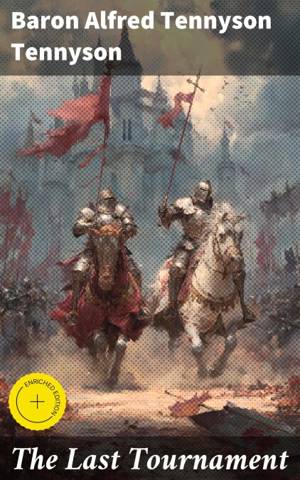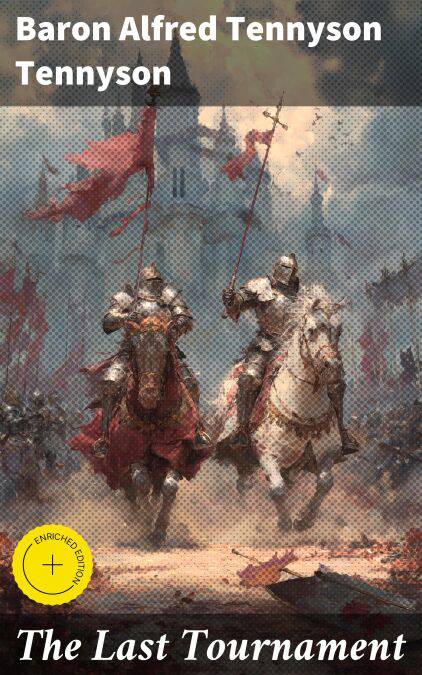
Bedankt voor het vertrouwen het afgelopen jaar! Om jou te bedanken bieden we GRATIS verzending (in België) aan op alles gedurende de hele maand januari.
- Afhalen na 1 uur in een winkel met voorraad
- In januari gratis thuislevering in België
- Ruim aanbod met 7 miljoen producten
Bedankt voor het vertrouwen het afgelopen jaar! Om jou te bedanken bieden we GRATIS verzending (in België) aan op alles gedurende de hele maand januari.
- Afhalen na 1 uur in een winkel met voorraad
- In januari gratis thuislevering in België
- Ruim aanbod met 7 miljoen producten
Zoeken
The Last Tournament E-BOOK
Enriched edition. A lyrical journey through the final joust of Camelot's heroes and villains
Baron Alfred Tennyson Tennyson
E-book | Engels
€ 1,99
+ 1 punten
Omschrijving
In "The Last Tournament," Baron Alfred Tennyson Tennyson weaves a poignant narrative that delves into the themes of nostalgia, valor, and the inevitable passage of time. This poem, written in the context of the Victorian era, employs a rich tapestry of vivid imagery and lyrical craftsmanship to convey the grandeur and decay of chivalric ideals. Through a series of interconnected vignettes, Tennyson reflects on the waning age of knights and their tournaments, ultimately illuminating the tension between honor and the disillusionment of modernity. The poem stands as a testament to Tennyson's mastery of form and rhythm, allowing readers to experience the emotional weight of a declining world where tradition grapples with transformative change. Tennyson, the Poet Laureate of the United Kingdom, was deeply inspired by the cultural shifts of his time, which included industrialization and changing social dynamics. His personal loss and grief, particularly the death of close companions, also colored his work, infusing it with a sense of melancholic reflection. "The Last Tournament" can be seen as a culmination of Tennyson's lifelong preoccupation with the complexities of honor and the transitory nature of existence, shaped by the historical context of Arthurian legends and modernity's encroachment upon them. I wholeheartedly recommend "The Last Tournament" to readers seeking a profound exploration of the knightly ethos juxtaposed with the somber realities of change. Tennyson's reflective poetry invites us to ponder the relevance of courage and nobility in our contemporary lives, making this work not only a remarkable literary achievement but also a timeless meditation on human experience.
In this enriched edition, we have carefully created added value for your reading experience:
- A succinct Introduction situates the work's timeless appeal and themes.
- The Synopsis outlines the central plot, highlighting key developments without spoiling critical twists.
- A detailed Historical Context immerses you in the era's events and influences that shaped the writing.
- An Author Biography reveals milestones in the author's life, illuminating the personal insights behind the text.
- A thorough Analysis dissects symbols, motifs, and character arcs to unearth underlying meanings.
- Reflection questions prompt you to engage personally with the work's messages, connecting them to modern life.
- Hand‐picked Memorable Quotes shine a spotlight on moments of literary brilliance.
- Interactive footnotes clarify unusual references, historical allusions, and archaic phrases for an effortless, more informed read.
In this enriched edition, we have carefully created added value for your reading experience:
- A succinct Introduction situates the work's timeless appeal and themes.
- The Synopsis outlines the central plot, highlighting key developments without spoiling critical twists.
- A detailed Historical Context immerses you in the era's events and influences that shaped the writing.
- An Author Biography reveals milestones in the author's life, illuminating the personal insights behind the text.
- A thorough Analysis dissects symbols, motifs, and character arcs to unearth underlying meanings.
- Reflection questions prompt you to engage personally with the work's messages, connecting them to modern life.
- Hand‐picked Memorable Quotes shine a spotlight on moments of literary brilliance.
- Interactive footnotes clarify unusual references, historical allusions, and archaic phrases for an effortless, more informed read.
Specificaties
Betrokkenen
- Auteur(s):
- Uitgeverij:
Inhoud
- Aantal bladzijden:
- 113
- Taal:
- Engels
Eigenschappen
- Productcode (EAN):
- 4064066091996
- Verschijningsdatum:
- 15/03/2020
- Uitvoering:
- E-book
- Beveiligd met:
- Digital watermarking
- Formaat:
- ePub

Alleen bij Standaard Boekhandel
+ 1 punten op je klantenkaart van Standaard Boekhandel
Beoordelingen
We publiceren alleen reviews die voldoen aan de voorwaarden voor reviews. Bekijk onze voorwaarden voor reviews.









